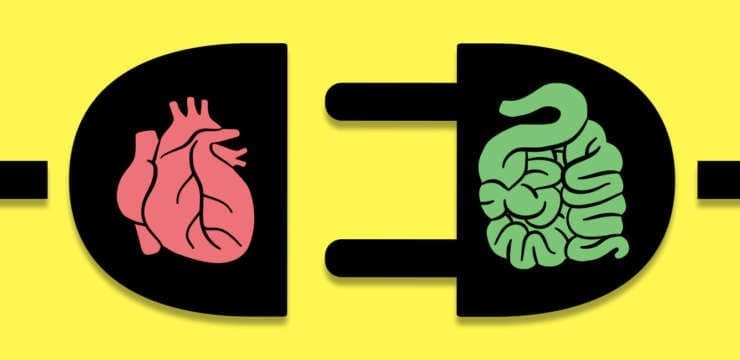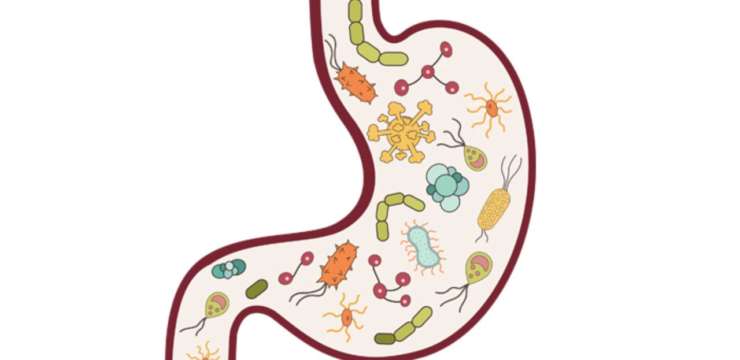The interaction between beneficial bacteria and the host is called symbiosis. Furthermore, symbiosis depends on multiple factors such as microbial diversity, nutritional intake, lifestyle factors,…

Gut and Intestinal Health: The health of an individual’s gut determines what nutrients are absorbed along with what toxins, allergens and microbes are kept out. It is directly linked to the health of the whole body. Intestinal health could be defined as optimal digestion, absorption, and assimilation of food. But this is a job that depends on many other factors. More than 100 million Americans have digestive problems. Two of the top-selling drugs in America are for digestive problems, and they run in the billions. There are more than 200 over-the-counter (OTC) remedies for digestive disorders. And these can and do create additional digestive problems.
If an individual’s digestion is not working properly, the first thing is to understand what is sending the gut out-of-balance in the first place.
Low-fiber, high-sugar, processed, nutrient-poor, high-calorie diet, causes all the wrong bacteria and yeast to grow in the gut and damages the delicate ecosystem in your intestines.
Overuse of medications that damage the gut or block normal digestive function, i.e. acid blockers (Prilosec, Nexium, etc.), anti-inflammatory medication (aspirin, Advil, and Aleve), antibiotics, steroids and hormones.
Undetected gluten intolerance, celiac disease or low-grade food allergies to foods such as dairy, eggs, or corn.
Chronic low-grade infections or gut imbalances with overgrowth of bacteria in the small intestine, yeast overgrowth, parasites.
Toxins like mercury and mold toxins damage the gut.
Lack of adequate digestive enzyme function, from acid-blocking medications or zinc deficiency.
Stress can alter the gut’s nervous system, cause leaky gut, and change the normal bacteria.
Visits for intestinal disorders are among the most common trips to primary care doctors. Most, which also includes most doctors, do not recognize or know that digestive problems wreak havoc in the entire body. This leads to allergies, arthritis, autoimmune disease, rashes, acne, chronic fatigue, mood disorders, autism, dementia, cancer, and more.
Having proper gut and intestinal health is absolutely central to your health. It is connected to everything that happens in the body.
Functional medicine and health coaches are able to look at the source of the gut imbalance and run diagnostic tests to discover the exact type and number of bacteria imbalances. From here, natural supplements can be recommended such as a probiotic to recreate a healthy gut microbiome.

The interaction between beneficial bacteria and the host is called symbiosis. Furthermore, symbiosis depends on multiple factors such as microbial diversity, nutritional intake, lifestyle factors,…

The beneficial effects of using probiotics in our diets or supplementation have been studied in the last years. Indeed, these studies provide positive information about…

The main focus of orthomolecular medicine is to treat the leading cause of the condition. Detecting the root cause is the cornerstone to determine the…

Histamine is closely related to allergies and immune responses. Certainly, histamine’s involvement in common allergies is the main reason why antihistamines were developed. However, the…

Gastrointestinal issues are one of the main reasons why patients come into a doctor’s office. Certainly, irritable bowel syndrome (IBS) is the primary gastrointestinal diagnosis.…

The world of medicine is continually advancing and growing. Research is being published every day on new ways to measure health. In recent years, the importance of Phase Angle has come to light.
Phase angleÂ
When reviewing InBody scans, there is one number we pay exceptional attention to. This number is the phase angle. The phase angle can be summed up as the quality and quantity of the health of a cell. Essentially, a GPA of an individual’s overall health. Phase angles measure oxidative stress, the aging stress on a cell, and the nutritional status. If cell membrane integrity begins to decline, so will the phase angle reported and vice-versa. Keeping track of this number will allow practitioners to determine if the patient responds to the therapeutic exercises, treatments, and lifestyle changes the clinic is implementing. Â
It is important to remember that when we exercise, we damage the cells and muscles. The act of building muscle is breaking down the muscle we have and recovering. This is why rest and nutrition are key.Â
Body Impedance Analysis (BIA)Â
At our clinic, we use the InBody 770. This technology provides beneficial information like muscle mass, fat mass, segmental fat, intracellular water, extracellular water, phase angle, visceral fat, and more. To learn more about BIA and phase angle, a video is provided below.Â
[embedyt] www.youtube.com/watch?v=MUCalp2SkNE%5B/embedyt%5D
TMAOÂ
Adding on to new research coming to light. It has been shown that TMAO is another significant factor to consider when looking at an individual’s overall health. TMAO is trimethylamine N-Oxide. Every individual has a unique microbiome comprised of healthy bacteria. However, microbiomes are full of unhealthy bacteria as well. As we eat, we consume TMA from red meat, egg yolk, and full-fat dairy products. TMA is later converted to TMAO in the liver. High levels can reduce the removal of bad cholesterol from the arteries and increase your heart attack and stroke risk. To remove TMAO, it is recommended that individuals eat a Mediterranean diet and limit red meat.Â
[embedyt] www.youtube.com/watch?v=-pTXvrPTmeI%5B/embedyt%5D
At the clinic, we have the capability to test for TMAO using Cleveland Heart Lab. Below is a sample report from Cleveland Heart Lab. Under the metabolic section, you can see the TMAO levels.Â
RESEARCH IS CONSTANTLY UNCOVERING NEW WAYS TO HELP PATIENTS PROTECT THEMSELVES FROM INFLAMMATION. BY PERFORMING THESE TESTS, WE CAN SEE IF AN INDIVIDUAL IS MORE SUSCEPTIBLE TO AN UNDERLYING CONDITION AND HAVE THEIR LEVELS TESTED APPROPRIATELY. THIS ALLOWS US TO CREATE A PERSONALIZED TREATMENT PLAN FOCUSED ON BRINGING THEM BACK TO OPTIMAL HEALTH. -KENNA VAUGHN, SENIOR HEALTH COACHÂ
References
Publishing, Harvard Health. “Red Meat, TMAO, and Your Heart.” Harvard Health, www.health.harvard.edu/staying-healthy/red-meat-tmao-and-your-heart. Â
Additional Online Links & Resources (Available 24/7)


Online Appointments or Consultations:  https://bit.ly/Book-Online-Appointment


Online Physical Injury / Accident Intake Form: https://bit.ly/Fill-Out-Your-Online-History


Online Functional Medicine Assessment:Â https://bit.ly/functionmed
Disclaimer
The information herein is not intended to replace a one-on-one relationship with a qualified health care professional, licensed physician, and is not medical advice. We encourage you to make your own health care decisions based on your research and partnership with a qualified health care professional. Our information scope is limited to chiropractic, musculoskeletal, physical medicines, wellness, sensitive health issues, functional medicine articles, topics, and discussions. We provide and present clinical collaboration with specialists from a wide array of disciplines. Each specialist is governed by their professional scope of practice and their jurisdiction of licensure. We use functional health & wellness protocols to treat and support care for the musculoskeletal system’s injuries or disorders. Our videos, posts, topics, subjects, and insights cover clinical matters, issues, and topics that relate and support, directly or indirectly, our clinical scope of practice.* Our office has made a reasonable attempt to provide supportive citations and has identified the relevant research study or studies supporting our posts. We provide copies of supporting research studies available to regulatory boards and the public upon request. We understand that we cover matters that require an additional explanation of how it may assist in a particular care plan or treatment protocol; therefore, to further discuss the subject matter above, please feel free to ask Dr. Alex Jimenez or contact us at 915-850-0900.  Read More…
Dr. Alex Jimenez DC, MSACP, CCST, IFMCP*, CIFM*, CTG*
email: coach@elpasofunctionalmedicine.com
phone: 915-850-0900
Licensed in Texas & New Mexico

The association between heart failure, cardiovascular disease, and fibrosis with a metabolic marker TMAO is key to preventing and reversing these chronic conditions. TMAO contributes…

All disease starts in the gut, but how? Intestinal permeability is a great contributor to metabolic and chronic conditions, as it allows bacterial translocation. Furthermore,…

The high prevalence of chronic conditions such as hyperlipidemia, hypertension, type 2 diabetes, and obesity have a close link to our society’s poor lifestyle habits.…

Inflammation Fighting Smoothie
Dark leafy greens as well as certain fruits are a great way to help the body naturally fight off inflammation. We’ve put together a simple smoothie that can be consumed every morning to fuel your body and help reduce inflammation.
¾ cup orange juice
½ cup ice
½ spinach
1 cup strawberries, sliced
½ cup blueberries
2 tbsp flax seed
Additionally, it is great to add powder pre and probiotics to smoothies. This ensures we are feeding the microbiome the healthy bacteria it needs to flourish.
For additional protein, add in 1 scoop protein powder or 5oz of greek yogurt

The overweight and obesity epidemic has taken over the world, promoting the prevalence of chronic diseases. The common denominator of this problem is our sedentary…

Tight Junctions (TJ) comprise different proteins that bind to the actin cytoskeleton to provide barrier integrity to our gut lining. Indeed, TJs are key assistance…

Our main interaction with food, pathogens, and inflammatory signals is made through our intestinal barrier. Indeed, our gut epithelium is where the absorption, digestion, transportation…

Innate and adaptive immunity responses often take the spotlight regarding the defense and protection against pathogens. Nevertheless, barrier tissues have proven to store inflammatory memory…

The link between microbiota and different factors such as exercise, genetics, disease, body composition, and nutritional intake is undeniable. However, this means that the…

Insulin resistance is a problem that is strongly associated with obesity due to excess body fat and diabetes. However, growing evidence suggests that gut microbiota…

Metabolic and chronic disorders have created a tremendous economic burden in developed and developing countries. The overproduction of reactive oxygen species (ROS), proinflammatory cytokines, and…